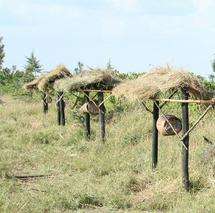Beehive fence deters elephant raiders

(PhysOrg.com) -- A fence made out of beehives wired together has been shown to significantly reduce crop raids by elephants, Oxford University scientists report.
The fence is constructed of log beehives suspended on poles beneath tiny thatched roofs (to keep off the sun). The hives are connected by eight metre lengths of fencing wire. Elephants avoid the hives and will attempt to push through the wire but this causes the hives to swing violently causing the elephants to fear an attack of angry bees.
The results of a pilot study in Kenya, published in the African Journal of Ecology, show that a farm protected by the beehive fence had 86 per cent fewer successful crop raids by elephants and 150 per cent fewer raiding elephants than a control farm without the fence.
The reduction occurred despite the fact that none of the hives were occupied at the time suggesting that elephants remember painful past encounters with African honeybees and avoid the sights and smells associated with them.
‘Our previous research has shown that elephants are scared away by recordings of the buzzing of angry bees,’ said Lucy King of Oxford University’s Department of Zoology who led the project in collaboration with the charity Save the Elephants. ‘We designed the beehive fence as an affordable and practical way of applying this knowledge to create a barrier that the elephants would be afraid to cross.’
‘The reaction from the farmers involved in our pilot study has been very positive,’ said Lucy King. ‘Our beehive fence design has been shown to be robust enough to survive elephant raids and cheap enough for farmers to construct themselves - especially as it also gives protection against cattle rustlers and, when occupied by colonies of African honeybees, will give the farmers two or three honey harvests a year that they can sell to offset the cost of building the fence.’
During the six-week pilot study the team used GPS to track one particularly notorious elephant raider dubbed ‘Genghis Khan’. Genghis was spotted raiding by several farmers and was observed amongst a herd of eighteen bull elephants returning from crop raids and his GPS movements were shown to closely match the routes of the raiding groups.
Despite their thick hides adult elephants can be stung around their eyes or up their trunks, whilst calves could potentially be killed by a swarm of stinging bees as they have yet to develop this thick protective skin.
Lucy King said: ‘We hope that these results will encourage farmers in other areas losing crops to elephant raiders to build their own beehive fences and help to reduce the conflict between humans and elephants that can lead to the tragedy of animals being shot, as well as farmers suffering devastating losses to the crops that are their livelihood.’
Provided by Oxford University (news : web)















